The PM 400 is a robust floor model with 4 grinding stations and accepts grinding jars with a nominal volume from 12 ml to 500 ml. It processes up to 8 samples simultaneously which results in a high sample throughput.
The extremely high centrifugal forces of Planetary Ball Mills result in very high pulverization energy and therefore short grinding times.
The mill is ideally suited for tasks in research like mechanochemistry (mechano-synthesis, mechanical alloying and mechanocatalysis), or ultrafine colloidal grinding on a nanometer scale, as well as for routine tasks such as mixing and homogenizing soft, hard, brittle or fibrous materials.
For mechanical alloying of hard-brittle materials, the PM 400 is available in a special “MA” version.
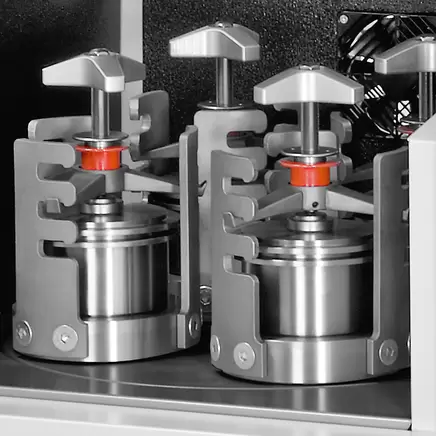
FAST & POWERFUL
- Loss-free size reduction down to the submicron range
- Wet grinding yields particle sizes in the nanometer range (<100 nm)
- Variable speed from 30 to 400 rpm,
speed ratio 1:-2 | 1:-2.5 | 1:-3 - Batch-wise processing with max. 4 x 220 ml
- 8 x 20 ml sample per batch with stacked jars
- Wide range of materials for contamination free grinding
REPRODUCIBILITY, SAFETY AND EASY HANDLING
- Reproducible results due to speed control
- Easy and safe clamping of grinding jars
- The Safety Slider prevents starting the machine without securely clamped jars
- Innovative counterweight and imbalance sensor for unsupervised operation
- Comfortable parameter setting via display and ergonomic 1-button operation
- Automatic grinding chamber ventilation
- 10 SOPs can be stored, programmable starting time
- Power failure backup ensures storage of remaining processing time
SETTINGS & OPTIONS
- Dry and wet grinding possible
- Suitable for long-term trials, 99:59:59 h max.
- Interval operation allows for cooling breaks
- Direction reversal helps to minimize caking effects
SAFETY FIRST: JAR CLAMPING
Operation of the RETSCH planetary ball mills is particularly safe. They feature a robust Safety Slider which ensures that the mill can only be started after the grinding jar has been securely fixed with a clamping device. The self-acting lock ensures that the jar is seated correctly and securely. This proven solid mechanical system is less failure-prone than electronic solutions - the user has full access to the sample at any time. When the electronic system fails, it is not possible to unlock the jars, for example.
WET AND NANO-SCALE GRINDING WITH THE PM 400
Wet grinding is used to obtain particle sizes below 5 µm, as small particles tend to get charged on their surfaces and agglomerate, which makes further grinding in dry mode difficult. By adding a liquid or dispersant the particles can be kept separated.
To produce very fine particles of 100 nm or less (nano-scale grinding) by wet grinding, friction rather than impact is required. This is achieved by using a large number of small grinding balls which have a large surface and many friction points. The ideal filling level of the jar should consist of 60 % small grinding balls.
For more details on jar filling, wet grinding and sample recovery watch the video.
The graphic shows the result of grinding glass at 360 rpm in the PM 400. After 1 h of pulverization in ethanol with 1 mm grinding balls, the D90 value of the original sample was reduced from 13 µm to 1.6 µm.
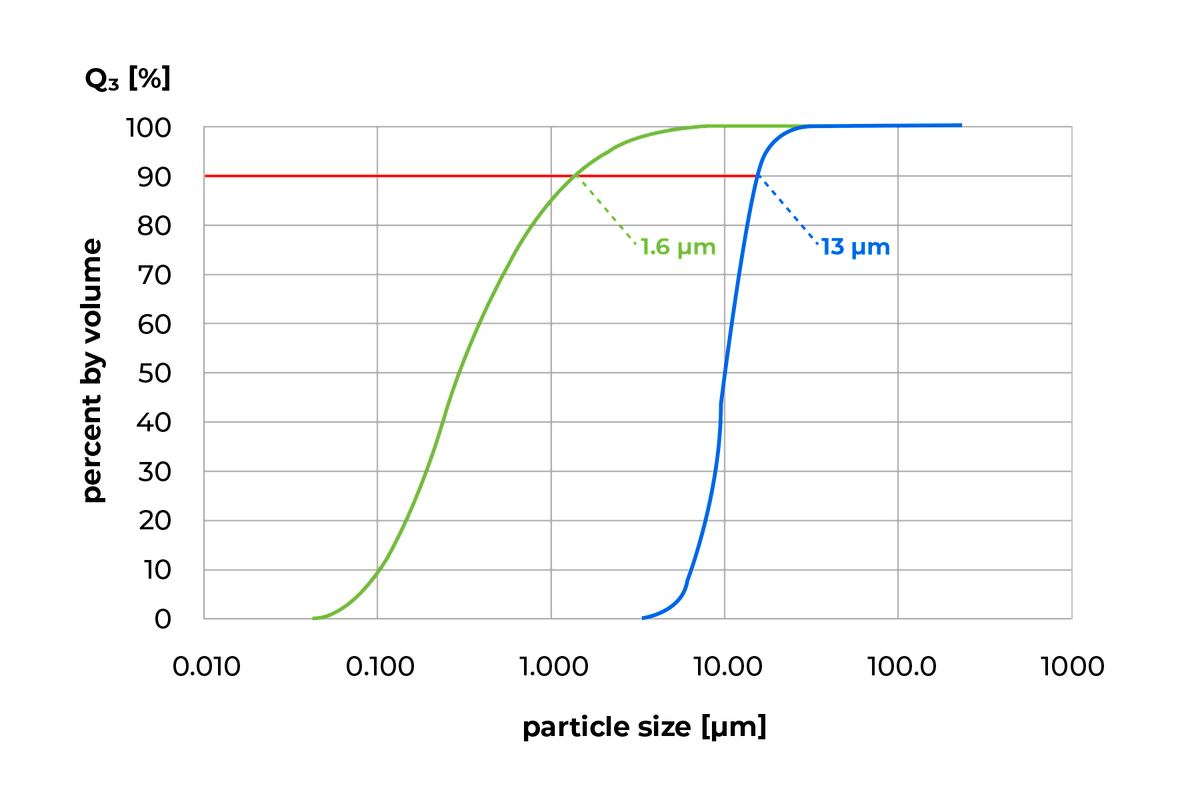
Blue curve: original sample; green curve: pulverized sample after 60 min.
PM 400 MA FOR MECHANOCHEMICAL APPLICATIONS
RETSCH Planetary Ball Mills are perfectly suited for processes like mechanical alloying or mechanosynthesis. For most ductile metals, the 1:-2 speed ratio of jar to sun wheel of the models PM 100 and PM 200 is fully adequate, as the ball charge produces enough impact energy to enable the forming of an alloy. However, greater energy is required for hard-brittle materials.
The PM 400 MA with an increased speed ratio of 1:-2.5 or 1:-3.0 is designed specifically for these applications. The optimum speed ratio and all other grinding parameters need be determined by trial and error for a specific product.
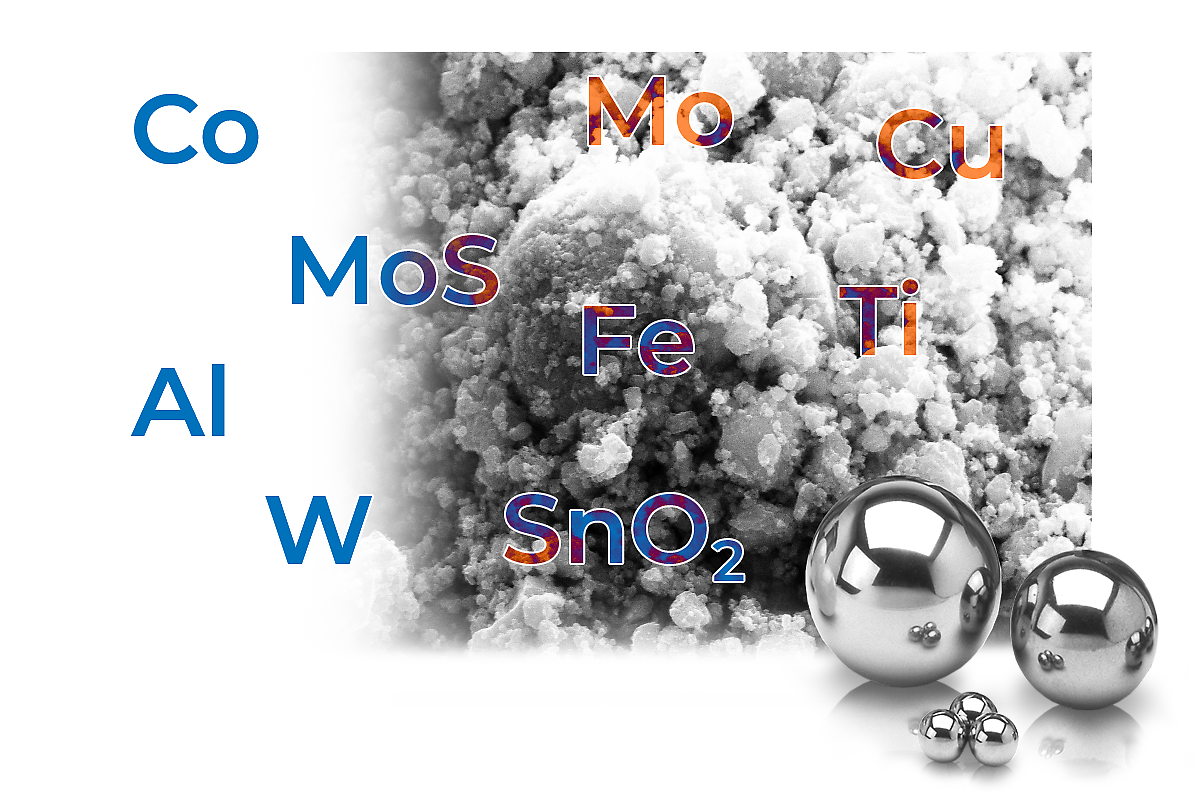
"COMFORT" GRINDING JARS FOR EXCELLENT RESULTS
The performance and the result of sample preparation are also determined by the choice of the grinding jar and its ball charge. The comfort range of grinding jars has been specially designed for extreme working conditions such as long-term trials, wet grinding, high mechanical loads and maximum speeds as well as for mechanical alloying.
- Available jar sizes: 12 ml / 25 ml / 50 ml / 80 ml / 125 ml / 250 ml / 500 ml
- Pressure-tight and dust-proof O-ring sealing prevents material spillage, even after clamping is released
- Jars and balls available in 7 materials: hardened steel, stainless steel, tungsten carbide, agate, sintered aluminium oxide, silicon nitride, zirconium oxide
- Stainless steel protective jacket for agate, sintered aluminum oxide, zirconium oxide and tungsten carbide grinding jars
- A groove between jar body and lid allows for easy opening of the lid, e. g. with the help of a spatula, if there are underpressure effects inside the jar
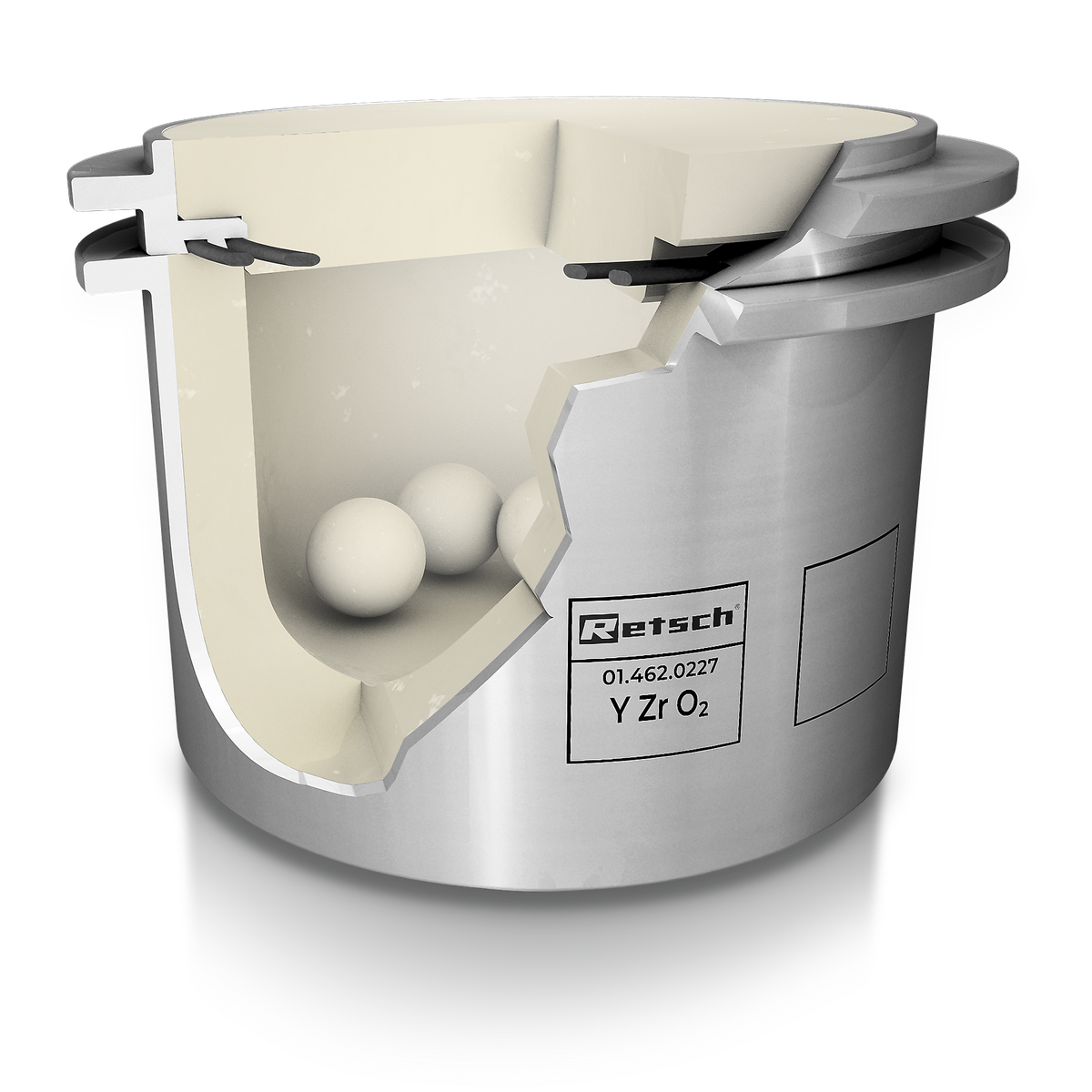
JARS & LIDS FOR SPECIAL APPLICATIONS
- For colloidal or wet grinding, the use of a grinding jar with a special closure device is recommended
- Aeration lids are designed for working under inert atmosphere, for example if oxygen can influence the grinding process or the mechanosynthesis. The lids allow the introduction of gases like argon or nitrogen into the grinding jar.
- Optional pressure and temperature measuring system PM GrindControl
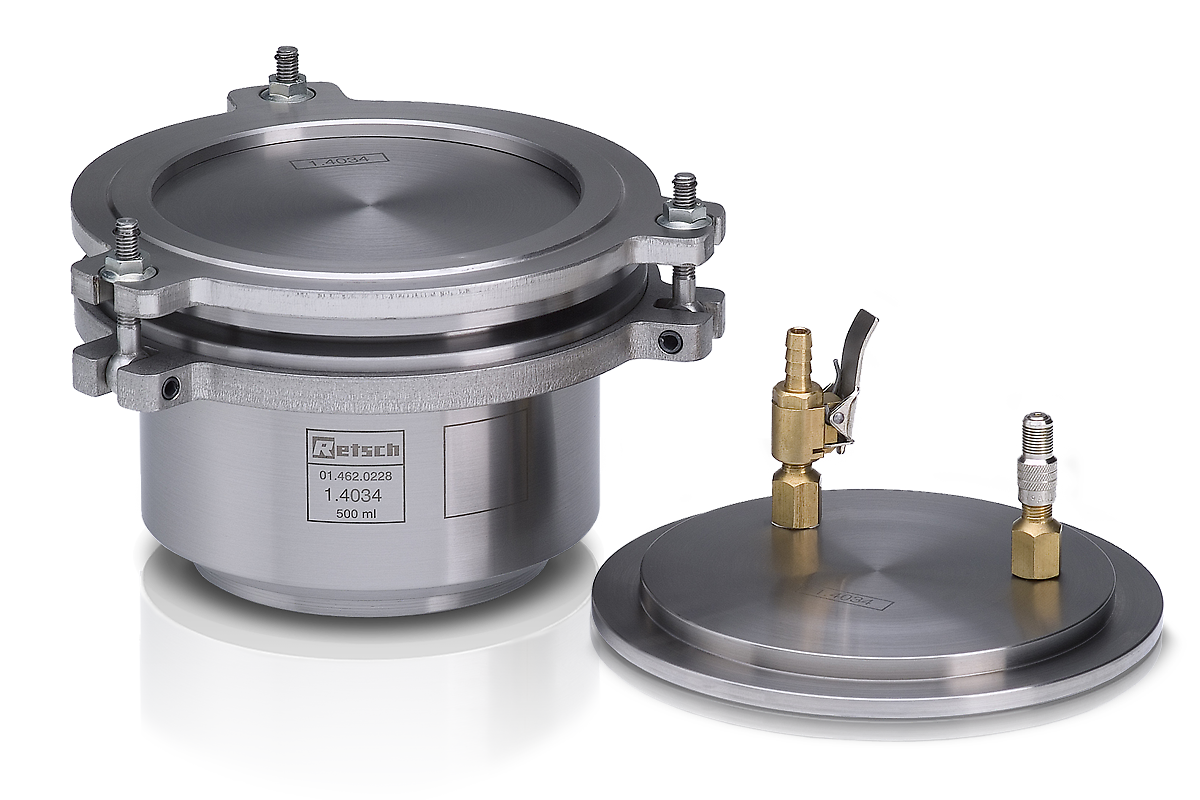
RECOMMENDED JAR FILLINGS
To produce optimum grinding results, the jar size should be adapted to the sample amount to be processed. The grinding balls are ideally sized 3 times bigger than the largest sample piece. Following this rule of thumb, the number of grinding balls for each ball size and jar volume is indicated in the table below. To pulverize, for example, 200 ml of a sample consisting of 7 mm particles, a 500 ml jar and grinding balls sized at least 20 mm or larger are recommended. According to the table, 25 grinding balls are required.
| Grinding jar nominal volume |
Sample amount | Max. feed size | Recommended ball charge (pieces) | ||||||
| Ø 5 mm | Ø 7 mm | Ø 10 mm | Ø 15 mm | Ø 20 mm | Ø 30 mm | Ø 40 mm | |||
| 12 ml | up to 5 ml | <1 mm | 50 | 15 | 5 | - | - | - | - |
| 25 ml | up to 10 ml | <1 mm | 100 | 25 | 8 | - | - | - | - |
| 50 ml | 5 – 20 ml | <3 mm | 200 | 45 | 10 | 7 | 3 | - | - |
| 80 ml | 10 – 35 ml | <4 mm | 250 | 70 | 25 | 10 | 5 | - | - |
| 125 ml | 15 – 50 ml | <4 mm | 500 | 110 | 30 | 18 | 7 | - | - |
| 250 ml | 25 – 120 ml | <6 mm | 1200 | 220 | 50 | 45 | 15 | 6 | - |
| 500 ml | 75 – 220 ml | <10 mm | 2000 | 440 | 100 | 70 | 25 | 8 | 4 |
The table shows the recommended charges (in pieces) of differently sized grinding balls in relation to the grinding jar volume, sample amount and maximum feed size.
TECHNICAL DATA
| Applications | pulverizing, mixing, homogenizing, colloidal milling, mechanical alloying, mechanosynthesis, nano grinding |
| Field of application | agriculture, biology, chemistry, construction materials, engineering / electronics, environment / recycling, geology / metallurgy, glass / ceramics, medicine / pharmaceuticals |
| Feed material | soft, hard, brittle, fibrous - dry or wet |
| Size reduction principle | impact, friction |
| Material feed size* | < 10 mm |
| Final fineness* | < 1 µm, for colloidal grinding < 0.1 µm |
| Batch size / feed quantity* | max. 4 x 220 ml, max. 8 x 20ml with stacked grinding jars |
| No. of grinding stations | 4 / 2 |
| Speed ratio | 1:-2 / 1:-2.5 / 1:-3 |
| Sun wheel speed | 30 - 400 min-1 |
| Effective sun wheel diameter | 300 mm |
| G-force | 26.8 g |
| Type of grinding jars | comfort, optional areation covers, safety closure devices |
| Material of grinding tools | hardened steel, stainless steel, tungsten carbide, agate, sintered aluminum oxide, silicon nitride, zirconium oxide |
| Grinding jar sizes | 12 ml / 25 ml / 50 ml / 80 ml / 125 ml / 250 ml / 500 ml |
| Setting of grinding time | digital, 00:00:01 to 99:59:59 |
| Interval operation | yes, with direction reversal |
| Interval time | 00:00:01 to 99:59:59 |
| Pause time | 00:00:01 to 99:59:59 |
| Storable SOPs | 10 |
| Measurement of input energy possible | yes |
| Interface | RS 232 / RS 485 |
| Drive | 3-phase asynchronous motor with frequency converter |
| Drive power | 1.5 kW |
| Electrical supply data | different voltages |
| Power connection | 1-phase |
| Protection code | IP 30 |
| Power consumption | ~ 2100 W (VA) |
| W x H x D closed | 836 x 1220 (1900) x 780 mm |
| Net weight | ~ 290 kg |
| Standards | CE |
| Patent / Utility patent | SafetySlider (DE 202008008473) |
*depending on feed material and instrument configuration/settings
-
ManufacturerRetsch GmbH
-
Country of OriginGermany
-
Model TypePM 400, PM 400/2, PM 400 MA
-
Voltage220–230 V, 50/60 Hz
-
Grinding Stationswith 4 Grinding Stations, Speed Ratio 1 : -2, with 2 Grinding Stations, Speed Ratio 1 : -2, with 4 Grinding Stations, Speed Ratio 1 : -2.5, for Mechanical Alloying, with 4 Grinding Stations, Speed Ratio 1 : -3, for Mechanical Alloying














